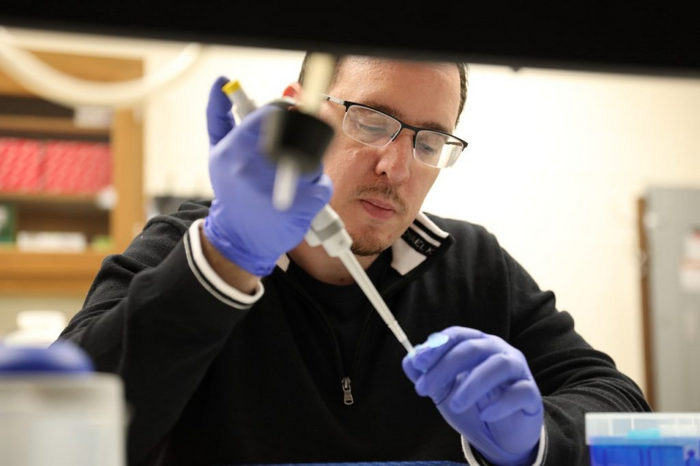The traditional line of thought is that post-traumatic stress disorder (PTSD) is caused by directly experiencing the traumatic event. However, about 10 percent of diagnosed PTSD occurs when people witness these events versus experiencing it directly themselves.

Credit: Photo by Max Esterhuizen for Virginia Tech.
The traditional line of thought is that post-traumatic stress disorder (PTSD) is caused by directly experiencing the traumatic event. However, about 10 percent of diagnosed PTSD occurs when people witness these events versus experiencing it directly themselves.
Little is known about these cases of PTSD, but that’s something that Tim Jarome, an associate professor in the College of Agriculture and Life Sciences School of Animal Sciences, is aiming to change with a $430,000 grant from the National Institute of Mental Health.
“Is it the same things happening in the brain to form or to develop this type of PTSD? And that will impact treatments,” said Jarome, the principal investigator of the project. “This project seeks to understand the impact on individuals witnessing traumatic events. What happens in the brain that leads to the formation of these very emotional experiences that lead to PTSD. This could lead to better treatment in the future.”
The research was inspired when Jarome watched a news story about people who hadn’t experienced a traumatic event yet showed symptoms that were consistent with PTSD.
“Is it fundamentally the same in terms of the molecular processes that lead to the development of PTSD? That’s what led to the idea,” Jarome said.
The researchers, who include Shaghayegh Navabpour, a Ph.D. candidate, are creating a behavioral paradigm to study this process and are studying gender differences, as PTSD is more common in women than men.
It is currently unknown if the brain responds the same way to these different types of experiences, meaning the molecular mechanisms that support the formation of indirectly or directly acquired fear memories that underlie PTSD could be different. As result, a better understanding of how indirectly acquired fear memories differ from those that are directly acquired is needed for developing therapeutic interventions.
Forms of PTSD are not created equal, and it’s important to understand each type of PTSD in order to develop better treatments, Jarome said.
“Traumatic events differ in their contribution to PTSD,” Jarome said. “We are seeking to understand how we indirectly learn fear associations, the brain molecular mechanisms by which this occurs and how this differs from those that are directly acquired, which we will hope will lead to novel insights into and treatments for PTSD.”



